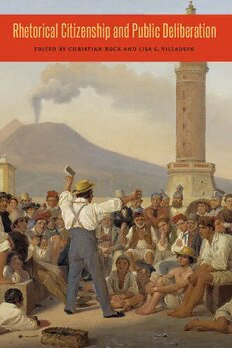
Rhetorical Citizenship and Public Deliberation PDF
Preview Rhetorical Citizenship and Public Deliberation
Rhetorical Citizenship and Public Deliberation edited by christian kock and lisa s. villadsen rhetorical citizenship and public deliberation VOLUME 3 edited by cheryl glenn and j. michael hogan the pennsylvania state university Editorial Board: Robert Asen (University of Wisconsin–Madison) Debra Hawhee (The Pennsylvania State University) Peter Levine (Tufts University) Steven J. Mailloux (University of California, Irvine) Krista Ratcliffe (Marquette University) Karen Tracy (University of Colorado, Boulder) Kirt Wilson (The Pennsylvania State University) David Zarefsky (Northwestern University) Rhetoric and Democratic Deliberation is a series of groundbreaking monographs and edited volumes focusing on the character and quality of public discourse in politics and culture. It is sponsored by the Center for Democratic Deliberation, an interdisciplinary center for research, teaching, and outreach on issues of rhetoric, civic engagement, and public deliberation. Other books in the series: Karen Tracy, Challenges of Ordinary Democracy: A Case Study in Deliberation and Dissent Samuel McCormick, Letters to Power: Public Advocacy Without Public Intellectuals RhetoRical citizenship and public delibeRation edited by christian kock and lisa s. villadsen The Pennsylvania State University Press | University Park, Pennsylvania Library of Congress Cataloging-in-Publication Data Rhetorical citizenship and public deliberation / edited by Christian Kock and Lisa S. Villadsen. p. cm. — (Rhetoric and democratic deliberation) Summary: “A collection of essays examining citizenship as a discursive phenomenon, in the sense that important civic functions take place in deliberation among citizens and that discourse is not prefatory to real action but in many ways constitutive of civic engagement”—Provided by publisher. Includes bibliographical references and index. isbn 978-0-271-05387-5 (cloth : alk. paper) 1. Citizenship. 2. Deliberative democracy. 3. Political participation. I. Kock, Christian. II. Villadsen, Lisa S., 1968– . JF801.R52 2012 323.601’4—dc23 2012009583 Copyright © 2012 The Pennsylvania State University All rights reserved Printed in the United States of America Published by The Pennsylvania State University Press, University Park, PA 16802-1003 The Pennsylvania State University Press is a member of the Association of American University Presses. It is the policy of The Pennsylvania State University Press to use acid-free paper. Publications on uncoated stock satisfy the minimum requirements of American National Standard for Information Sciences— Permanence of Paper for Printed Library Material, ANSI Z39.48–1992. This book is printed on Nature’s Natural, which contains 30% post-consumer waste. CONTENTS Introduction: Citizenship as a Rhetorical Practice / Christian Kock and Lisa S. Villadsen 1 section i: tracing rhetorical citizenship as concept and practice 1 Deliberative Democracy: Mapping Out the Deliberative Turn in Democratic Theory / Kasper Møller Hansen 13 2 The Making of Truth in Debate: The Case of (and a Case for) the Early Sophists / Manfred Kraus 28 3 The Search for “Real” Democracy: Rhetorical Citizenship and Public Deliberation in France and the United States, 1870–1940 / William Keith and Paula Cossart 46 section ii: public deliberation as rhetorical practice Part 1 Considering Norms of Communicative Behavior 4 The Respect Fallacy: Limits of Respect in Public Dialogue / Italo Testa 69 5 Dialectical Citizenship? Some Thoughts on the Role of Pragmatics in the Analysis of Public Debate / Niels Møller Nielsen 86 6 Provocative Style: The Gaarder Debate Example / Marie Lund Klujeff 101 vi contents 7 Virtual Deliberations: Talking Politics Online in Hungary / Ildikó Kaposi 115 Part 2 Critiques of “Elite” Discourse 8 Dis-playing Democracy: The Rhetoric of Duplicity / Kristian Wedberg 137 9 Rhetoric of War, Rhetoric of Gender / Berit von der Lippe 153 10 Speaking of Terror: Norms of Rhetorical Citizenship in Danish Public Discourse / Lisa S. Villadsen 169 11 “This May Be the Law, but Should It Be?”: Tony Blair’s Rhetoric of Exception / Bart van Klink and Oliver W. Lembcke 181 Part 3 Rhetorical Citizenship Across Communicative Settings 12 I Agree, but . . . : Finding Alternatives to Controversial Projects Through Public Deliberation / James McDonald 199 13 Deliberation as Behavior in Public / Tatiana Tatarchevskiy 218 14 Homing in on the Arguments: The Rhetorical Construction of Subject Positions in Debates on the Danish Real Estate Market / Sine Nørholm Just and Jonas Gabrielsen 232 15 Danish Revue: Satire as Rhetorical Citizenship / Jette Barnholdt Hansen 249 section iii: toward better deliberative practices 16 Presidential Primary Debate as a Genre of Journalistic Discourse: How Can We Put Debate into the Debates? / John Adams and Stephen West 267 contents vii 17 A Tool for Rhetorical Citizenship: Generalizing the Status System / Christian Kock 279 18 Interpretive Debates Revisited / Georgia Warnke 296 About the Contributors 315 Index 321 introduction: citizenship as a rhetorical practice Christian Kock and Lisa S. Villadsen The assemblies . . . will deliberate better when all are deliberating jointly, the common people when with the notables and these when with the masses. —Aristotle, Politics There is a relationship between attentiveness and care, and to care about democracy is to care whether and how citizens speak. —Robert Hariman, “Amateur Hour: Knowing What to Love in Ordinary Democracy” Citizenship has long been a keyword among educators, philosophers, and political theorists. Using the phrase “rhetorical citizenship” as a unifying perspective, this book aims to develop an understanding of citizenship as a discursive phenomenon in the sense that important civic functions take place in deliberation among citizens, and that discourse is not prefatory to real action but is in many ways constitutive of civic engagement. The book pursues this aim by bringing together, in a cross-disciplinary effort, contribu- tions by scholars in fields that rarely intersect. Liberal vs. Republican Notions of Citizenship For the most part, discussions as well as implementations of citizenship have focused on those aspects of it that are central to the “liberal” tradition of social thought—that is, questions of the freedoms and rights of citizens and groups. The essays in this volume give voice to a “republican” conception in the thinking about citizenship. Seeing participation and debate as central to being a citizen, this tradition looks back to the Greek city-states and republican Rome.
